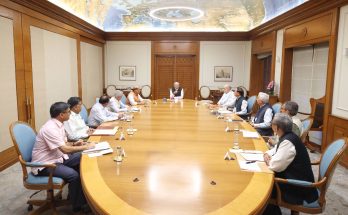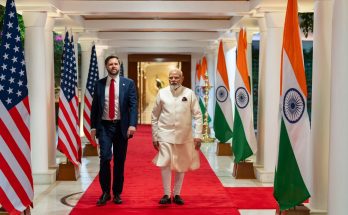
India has begun its diplomatic calendar for 2021 with a ceremony marking the beginning of its eighth term as one of the five non-permanent members of United Nations Security Council (UNSC). Starting January 1, 2021, India, along with Ireland, Mexico, Norway and Kenya, began their two-year tenure in the UN top body for peace and security. Setting the tone for the two-year term, India’s Permanent Representative to the UN T.S Tirumurti outlined India’s key priorities at a formal flag installation ceremony at the UN Headquarters in New York on January 4.
Inclusive Solutions
“We will use our tenure to bring human-centric and inclusive solutions to matters of international peace and security. India will be a voice for the developing world,” said the veteran diplomat. “We will not shy away from raising our voice against the common enemies of humanity like terrorism,” said Mr Tirumurti. “India comes into the Security Council as the largest democracy representing 1/6th of humanity and with a strong commitment to reformed multilateralism, rule of law, a fair and equitable international system and to peace, security and development,” the envoy said.
The envoy underlined that India will focus on key issues such as peace-keeping, peace-building, maritime security, women and youth, especially in conflict situations, and technology with a human face during its tenure on the Security Council. India will be UNSC President in August 2021 and will preside over the Council again for a month in 2022.
Reformed Multilateralism
“India has entered the UNSC at a time when the world is grappling with issues relating to pandemic mitigation and post-pandemic economic recovery. Geopolitical rivalry has been sharpening between the Big 3 of the UNSC, including US, China and Russia. India can be a bridge-builder,” said Manish Chand, Editor-in-Chief, India Writes Network and India and the World magazine.
Promoting reformed multilateralism will be high on India’s agenda. “Reformed multilateralism essentially means across-the-spectrum reform of key institutions who form part of the current global governance architecture, political and economic,” said Mr Chand. “What it means in effect is that the world needs to not only focus on reforms of the UN and UNSC reforms but the whole of global governance architecture, which remains heavily tilted in favour of rich Western countries,” said Mr Chand, who has written extensively on the UN-related issues from New York and New Delhi.
Chasing Permanent Seat
For a long time, India has been pushing vigorously for a permanent seat in the UNSC, but China, as one of the five permanent members, is widely seen to be stonewalling India’s efforts time and again. By any calculus, India qualifies for a permanent seat at the UNSC. India not only funds the UN substantially, but also contributes to its peacekeeping missions. India has established itself as a responsible nuclear power and is a member of various export control regimes like the Missile Technology Control Regime (MTCR), Wassenaar Arrangement and Australia Group.
During the pandemic, India has acted as a first responder by deploying medical teams to four of its neighbours and supplying medicines to around 150 countries, further bolstering its claims to a permanent seat. India has teamed up with the emerging powers, including Japan, Germany and Brazil, as part of the G4 initiative which has been campaigning for equal representation and participation of developing countries in the UNSC. The UNSC, established in 1946, is responsible for the maintenance of international peace and security. The membership comprises five permanent members-China, France, Russia, the UK and the US as well as ten non-permanent members elected for a two -year term.
(Palak Chhabra contributed inputs for this article)
Author Profile
- India Writes Network (www.indiawrites.org) is an emerging think tank and a media-publishing company focused on international affairs & the India Story. Centre for Global India Insights is the research arm of India Writes Network. To subscribe to India and the World, write to editor@indiawrites.org. A venture of TGII Media Private Limited, a leading media, publishing and consultancy company, IWN has carved a niche for balanced and exhaustive reporting and analysis of international affairs. Eminent personalities, politicians, diplomats, authors, strategy gurus and news-makers have contributed to India Writes Network, as also “India and the World,” a magazine focused on global affairs.
Latest entries
 India and the WorldApril 23, 2025Kashmir terror: India hits back at Pakistan, highlights cross-border linkages
India and the WorldApril 23, 2025Kashmir terror: India hits back at Pakistan, highlights cross-border linkages India and the WorldApril 23, 2025The Century of America and India: Growing Together
India and the WorldApril 23, 2025The Century of America and India: Growing Together In ConversationApril 20, 2025India Can Contribute Largely to Development of Morocco’s Defence Industry: Ambassador
In ConversationApril 20, 2025India Can Contribute Largely to Development of Morocco’s Defence Industry: Ambassador India and the WorldApril 2, 2025Mapping Next Steps for BIMSTEC
India and the WorldApril 2, 2025Mapping Next Steps for BIMSTEC







